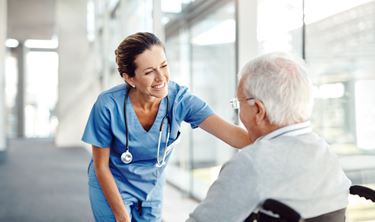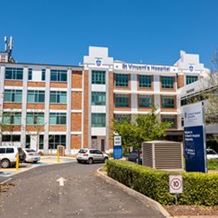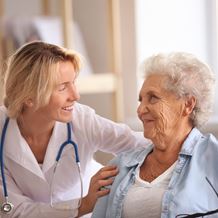Patient resources Patient Information & Safety- falls prevention

- Home
- Our Hospitals
- St Vincent’s Private Hospital Toowoomba, QLD
- Patient Information
- Patient Information & Safety- Falls prevention
Did you know that patients can fall while in hospital? While some falls cause no injuries, others can cause serious harm. Falls can also result in a person fearing further falls and prolonging their stay.
There are usually a number of reasons for someone falling. These may include poor balance, incontinence, unfamiliar environments and obstacles, poor eyesight, unsafe footwear, slippery surfaces and some medications, to name a few.
There are a number of ways to reduce your chance of falling. Staff will help you by:
- helping you to settle in, keeping your surroundings safe and providing you with falls prevention information
- assessing your risk of falling and discussing the results with you
- developing and implementing a falls prevention care plan suited to your needs
- referring you to other staff who specialise in different areas
- organising home visits by occupational therapists or physiotherapists before and after discharge to help you make your home safer, suggest changes to your home or to give advice about equipment to help you move safely
What you can do before being admitted
- bring to hospital any equipment you normally use, such as glasses and walking aids.
- bring to hospital all medications you are currently taking and any information on them.
- On admission, a falls risk assessment will be completed to determine if you are at risk of a fall. If you are rated as being a high falls risk, strategies will be discussed with you and your relatives to help you avoid a fall.
What can you do when you are in hospital?
- always use your call bell early if you require
- assistance and keep it in easy reach
- take your time when getting up from sitting or lying down.
- let staff know if you feel unwell or unsteady on your feet
- if staff recommend that you need assistance or supervision when moving, please ask them for this assistance and wait until they come to help you
- familiarise yourself with your room, its furniture and bathroom
- look out for hazards that may cause a fall, such as spills and clutter, and tell staff about them promptly
- if you have your prescribed a walking aid, make sure it is in good condition and that you use it for balance rather than furniture or walls
- if you have glasses, only wear your distance ones when walking; take special care when using bifocal or multifocal glasses
- wear comfortable clothing that is not too long or loose; whenever you are up and about, wear comfortable, low-heeled and nonslip shoes that fit you well, rather than slippers
- always keep your fluid levels up because dehydration can disorient you
Getting up
- when you are moving from lying down to standing up, try to sit on the bed for a minute or two before standing up
- move your ankle up and down to get the blood flowing
- get your “nose over your toes” before you stand up
- push yourself up off the bed or chair; don’t pull yourself up
- wait a minute before you start walking
When you are walking
- take your time when turning around; count your steps to pace yourself
- if you have a walking aid, make sure it is in good condition and the right size and height for you
- use your walking aid and do not rely on furniture for support as it may topple
- always wear suitable footwear that is non-slip and comfortable
What happens if you fall?
If you do have a fall the hospital staff will take action to identify what contributed to your fall and reduce the risk of you falling again. You may be assessed by a doctor, and staff will repeat your falls risk assessment. This may mean that your care plan will need to be changed. However, any changes to your care plan will be discussed with you.
Remember: Preventing falls is important when you go home as well, so before you leave hospital you may be referred to follow-up services to make your home safer and to reduce your risk of falling.
Other resources
Will you stay active and independent checklist
www.health.qld.gov.au/stayonyourfeet
This short checklist helps older people identify reasons why they may fall. Any concerns can be discussed with a health professional.
The Queensland stay on your feet checklist
www.health.qld.gov.au/stayonyourfeet
Related Content

Patient Information & Safety- Admission Information
Information about patient admission at St Vincent's Private Hospital Toowoomba.
Read More
Patient Information & Safety- Delirium
Delirium is a confusion that often happens suddenly and can fluctuate during the course of a day.
Read More
Patient Information & Safety- Informed Decision Making
Information about informed decision making.
Read More
